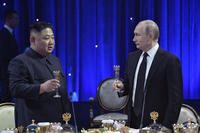
A great analysis on the tanker deal from my old friend Loren Thompson of the Lexington Institute who's name is "Mud" to pro-Boeing lawmakers...
If you want to understand how former allies end up going to war -- or former lovers end up getting divorced -- take a look at how Boeing and the Air Force are treating each other in their angry confrontation over the award of a next-generation tanker program to Northrop Grumman. Boeing expected to win the contract, and now finds itself facing the prospect of losing a 50-year aerial refueling franchise (and $100 billion in sales) while its main rival in the commercial airliner business sets up shop on Boeing's home turf. Boeing is convinced it should have won, and is spending millions of dollars on lawyers and advertising to press its case in a formal complaint to the Government Accountability Office.
Air Force leaders, on the other hand, believe that Boeing is willfully mis-stating the facts in a bid to obscure the inferior performance of the plane it proposed. A marathon session of Air Force acquisition experts two weeks ago concluded that none of the 200 issues raised by Boeing in its complaint to GAO was likely to be upheld, and that whatever minor problems the accountability office might uncover would be far from sufficient to overturn a competitive outcome the service says was not close. Beyond the merits of Boeing's case, Air Force officials are insulted by the tone of the company's public statements, which have used phrases such as "deeply flawed" and "severely prejudiced" to describe the tanker selection process.
The deterioration of Boeing's relationship with its biggest government customer hit a new low last week, when Air Force insiders began hinting darkly that the company had encouraged Missouri Senator Claire McCaskill to question the ethics of the service's chief of staff in a letter concerning an unrelated contracting matter. The notion that Boeing would do such a thing seems exceedingly unlikely, since the chief was widely believed to favor Boeing's tanker bid and the company's relationship with McCaskill is lukewarm at best (even though its defense unit is headquartered in her state). But the tone of Boeing's tanker campaign has led at least some service officials to believe the worst about the company, a feeling that is spreading far beyond tankers. For instance, the service has probably delayed announcing award of the GPS III satellite contract in part because it fears another Boeing protest.
What's fascinating about this confrontation is that the two parties embrace completely contradictory views of reality, and yet the partisans on each side are absolutely convinced that their version of the facts is the only true account. If there's anyone inside Boeing who thinks the tanker competition was rigorous and transparent, I can't find them. And if there's anyone inside the Air Force that thinks Boeing's protest has any merit, they're hiding from me. The stark difference in how the combatants see the same events seems more like a case study in Balkan politics than the button-down world of defense acquisition.
A sage observer of human nature commented in the Wall Street Journal some years ago that the great achievement of American capitalism was to channel impulses that led to rape and pillage during earlier civilizations into constructive forces for economic progress. That's an important insight, but sometimes in the rough and tumble of competition we see hints of how recently mankind emerged from the jungle. When rival cultures begin hating each other, their behavior can easily spill beyond the bounds of rationality. So Boeing and the Air Force need to catch their breath, tone down their rhetoric, and realize that they both still need each other to succeed.
And Reuters reports the same day Boeing exec agrees to shave down the "sharp elbows."
-- Christian








